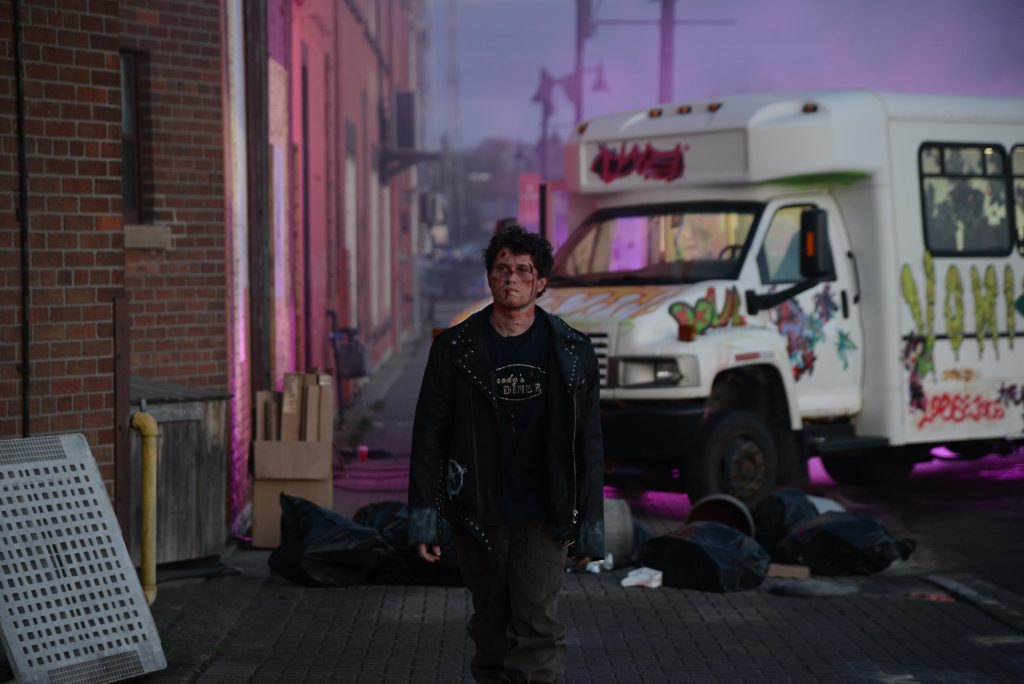Time and time again, it has been said that horror has always been political. That rings true now more than ever. Sometimes it takes shock, violence, and grotesqueries to get your point across; horror is the perfect medium. Horror exists in a state where you can casually enjoy a film that has deeper meanings lurking below the surface. It’s where saying little can be more important than saying a lot. But sometimes you run into a film that wears its commentary on its sleeve…and sometimes that can be a bit too much.
Violence: A Bloody Tale of Drugs and Deception
Henry Violence (Rohan Campbell) finds himself embroiled in a high-stakes game of life, death, drugs, and deception. The titular [Henry] Violence attempts to locate his former lover, Charlotte (Sarah Grey), in the hopes of saving her life before she falls deeper into despair. Mirroring Violence’s noble fight are Charlie Rocket (Maddie Hasson) and her sidekick Bats (Tomaso Sanelli)–two do-gooder vigilantes attempting to overthrow local drug kingpin Jimmy Jazz (Joris Jarsky). But with power comes imbalance. Who will survive the inherent violence that persists within this alternate 1980s hellscape? Who…will succumb to Violence?
Written by Connor Marsden, Devin Myler, and William Woods, and directed by Marsden, Violence is a confusing, but bloody-as-hell adventure. This film kicks off with flashy, well, violence, and maintains its energy throughout the entire runtime. It’s a fairly cut-and-paste crime thriller that attempts to make a name for itself with dazzling practical effects and a healthy dose of digital enhancements. Marsden knows and understands the tone he wanted to portray, and you cannot fault him for leaning into it. However, that might be a fault for many viewers.
The Film’s Strengths and Weaknesses
Violence is brash in nature. Its violence is unrelenting and harsh. But the film cannot stand on some nifty practical effects alone. Rohan Campbell’s grimacing performance lends much to the impactful nature of the film. For those who only have Corey Cunningham as a reference to Campbell, it’s a departure from the quirky (killer) boy-next-door act he puts on. Campbell has all of the trappings to be one of horror’s next big things, and powerful performances like Henry Violence prove he’s down for the task. Also, a huge shout-out to Sarah Grey, who does a wonderfully respectful Courtney Love-esque performance while still making it completely her own.
Co-writer/director Connor Marsden does show extreme promise with his directorial feature debut. He proves he can bring flash and substance to a story. But it’s the substance of Violence that forced me to waver in my overall enjoyment. It’s hard to get into the details without spoiling the contents of the film, though it’s the message of the story that prompted me to write my soapbox opening paragraph. Violence contains muddled messaging of accepting violence because moderation yields no results; what’s righteous to one is evil to another. That’s the crux of what modern politics are today.
Political Commentary in Horror: Does Violence Miss the Mark?
Marsden’s overall message is that revolution doesn’t really matter. Why bother filling an evil void with good if the good is just as evil as those they sought to overthrow? Horror NEEDS to be a voice for good. Horror needs to force us to ask the hard questions. Instead of doing any of that, Violence throws its hands up in the air and says, “c’est la vie.” Look what happened in Nepal! Moderation is not the answer. I’m not advocating for political violence. I do not believe violence is the answer. But if you’re making a film literally called Violence…then maybe we can have it be the answer just this once.
There’s a lot to enjoy in Violence. If you want to shut off your brain, see some great practical effects, and *checks notes* catch a visual Irreversible homage, then Violence is the film for you. If you want to watch a film that understands how to make a message that knows good versus evil, that knows how to spark a revolution, then Violence won’t be that film. I don’t put any blame on Rohan Campbell for taking this role. This film had every chance to be Campbell’s Eric Draven moment. It just left me wanting a more succinct and well-crafted ideology behind it.
